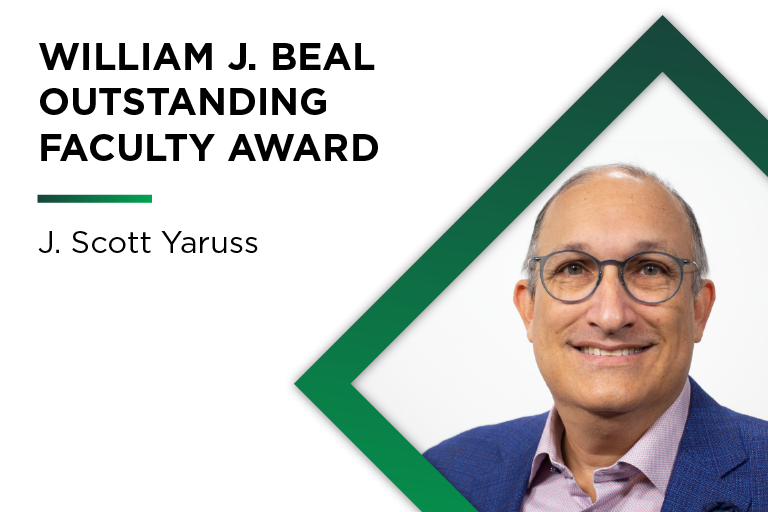J. Scott Yaruss, Ph.D. is being recognized as the 2024 recipient of the William J. Beal Outstanding Faculty Award for his work surrounding understanding, addressing, and supporting individuals who stutter. The William J. Beal Outstanding Faculty Award, one of the university’s highest accolades, is bestowed on up to 10 nominees each year for “outstanding total service to the University.” Nominees usually have at least five years of service at MSU.
Yaruss is a professor of Communicative Sciences and Disorders, a practicing speech-language pathologist, and a board-certified specialist in stuttering. He joined the Michigan State University faculty in 2017, with the overarching goal of helping speech-language pathologists improve their ability to provide meaningful and lasting support for people who live with stuttering.
“I started my studies in speech language pathology in 1989,” Yaruss said. “My undergraduate was in linguistics and in psychology, and I wanted to find a field where I could study language, because I love language and people, because I love to study the psychology of people.”
Yaruss, who is also director of the Spartan Stuttering Laboratory within the Department of Communicative Sciences and Disorders, says an encounter with a speech language pathologist who worked with children turned into a summer volunteer stint in her center at UC-Berkeley. Later, as a graduate student at Syracuse University, Yaruss began to do serious lab research on stuttering.
He had found a discipline that combined his two undergraduate passions.
And he loved it.
“So, it was a lot of luck,” Yaruss said. “I’ve been fortunate to fall into a career that’s allowed me to pursue my research interests while helping people improve their lives.”
Over his career, Yaruss has watched his field shift focus from the physical speech-related aspects of stuttering to its broader life consequences.
“The focus of my research for 30 years now has been on documenting that adverse impact; what it is that people who stutter live with, what those negative consequences are, and then alleviating that adverse impact,” said Yaruss.
The National Institute on Deafness and Other Communicative Disorders (NIDCD) estimates that stuttering affects about 3 million people in the U.S. There’s no cure for stuttering, Yaruss notes. Instead, he helps people learn to communicate freely and authentically, without being held back by their speaking difference.
“But to do that, they've got to understand more about what they're experiencing,” said Yaruss. “Just as there’s the external stigma, there's the internal stigma. And where we start in therapy is diminishing that internal stigma…helping people learn that what they say is valuable, even if it's said with a stutter.”
Yaruss is currently working with grants from the National Institutes of Health (NIH) and the National Science Foundation (NSF). The NIH project focuses on understanding why stuttering varies so much across situations. The NSF project focuses on a prototype app called HeardAI that enables phones and other voice recognition software to recognize stuttered speech.
Yaruss will be formally presented with the William J. Beal Outstanding Faculty Award on May 1. He calls the honor a validation of his life’s work.
“The thing that overwhelms me is there's a lot of great faculty here,” Yaruss says. “Every person in my department is outstanding. To receive recognition from this group in particular, I feel honored and grateful.”
By Kevin Lavery
